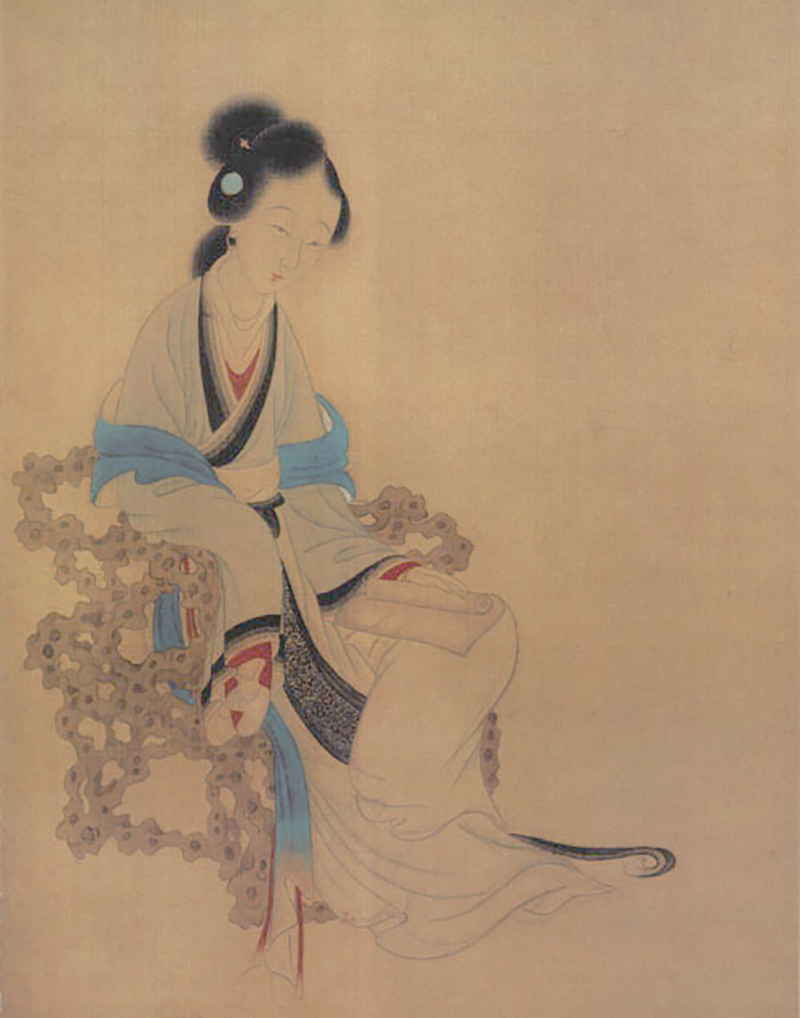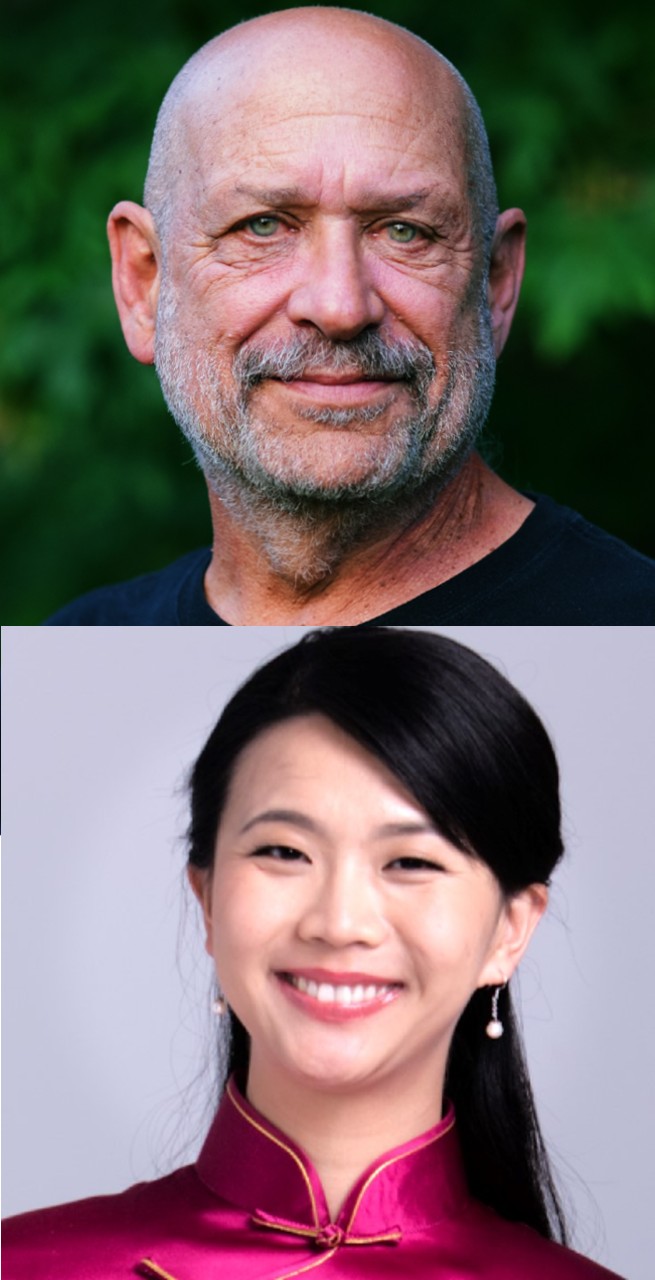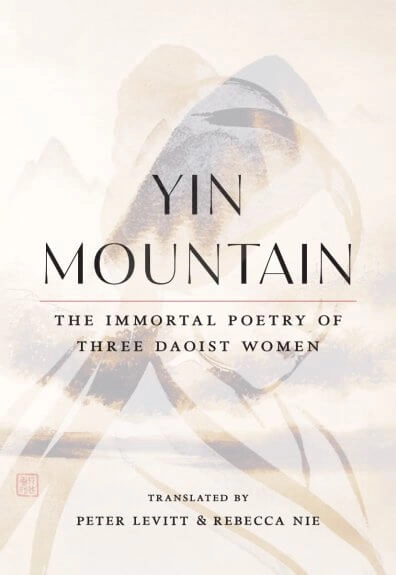FarewellFlexible, without its own form, water settles into what holds it.Clouds arise from no-mind, but they are willing to return.Spring winds spread melancholy over the river as the sun descends—separated from her companions, a wild duck flies alone. 送別水柔逐器知難定,雲出無心肯再歸。惆悵春風楚江暮,鴛鴦一隻失群飛。 About Joy and LossA branch of bay laurel blends in elegance with dark mist,alongside rivers, ten thousand peach trees blossom red in the rain. For now, let’s get drunk with celebratory cups of wine and leave your sad gazing behind—from ancient times until now, sorrow and joy have been just the same. 和新及第悴亡詩一枝月桂和烟秀,萬樹江桃帶雨紅。且醉尊前休悵望,古來悲樂與今同。
Two Poems
Yu Xuanji
Translated from the Chinese by Peter Levitt & Rebecca Nie
Translator’s Notes
ON FAREWELL:
While water and clouds are traditional Chinese poetic symbols of romantic and sensual love, Daoism adds the qualities of kindness, nourishment, and freedom. It’s worth noting that the double symbolism may not be coincidental. As the poem begins, Yu Xuanji sets the tone for the flexible nature of both the imagery and the practitioner’s mind by pointing to the flexible nature of water. This imagistic conceit first appears in chapter 18 of the Dao De Jing as an expression of a common Daoist ideal. Later on, it became an expression of the flexible nature of accomplished Daoists. Likewise, in Chinese culture, Mandarin ducks—especially when in a pair or a flock—are symbols of love in the intimate relationship of marriage. In a poetic move that Yu tends to employ in order to combine spiritual and romantic content, resulting in what may be considered her spiritual love poems, “Farewell” concludes with an image that would be particularly poignant at the time of its composition.
Feature Date
- October 13, 2023
Series
- Translation
Selected By
Share This Poem
Print This Poem
“Farewell” and “About Joy and Loss” from YIN MOUNTAIN: THE IMMORTAL POETRY OF THREE DAOIST WOMEN translated by Peter Levitt and Rebecca Nie published by Shambhala Publications.
Copyright © 2023 by Peter Levitt and Rebecca Nie.
All rights reserved.
Reproduced by Poetry Daily in arrangement with Shambhala Publications, Inc.

Yu Xuanji was born in Chang’an, the Tang capital city, around the year 843 C.E., and executed there in 868 C.E., at the approximate age of only twenty-five. During her short life, she traveled the realm, navigated the landscape of complex and often treacherous social and religious strata, and inspired generations with her life, talent, and beauty.

Peter Levitt’s books of poetry, prose, and translation include One Hundred Butterflies, Within Within, Fingerpainting on the Moon: Writing and Creativity as a Path to Freedom, and his collaborative translations with Kazuaki Tanahashi, The Complete Cold Mountain: Poems of the Legendary Hermit Hanshan, A Flock of Fools: Ancient Buddhist Tales of Wisdom and Laughter, and The Essential Dogen: Writings of the Great Zen Master. In 1989, he received the Lannan Foundation Award in Poetry. He is the founding and guiding teacher of the Salt Spring Zen Circle in the lineage of Shunryu Suzuki Roshi. He lives on Salt Spring Island, British Columbia, with his wife, poet Shirley Graham.
Rebecca Nie is a Chinese American Zen master, scholar, and award-winning algorithm and new media artist. Born in China and came of age in Canada and the United States, Z.M. Nie now serves as the Buddhist Chaplain-Affiliate at Stanford University. Chinese literature and cultural heritage are some of Z.M. Nie’s life-long passions: she started writing Chinese poetry at the age of nine, studied the Song of Chu at ten, and by fifteen years old, she memorized key passages from Tao Te Ching and Zhuang Zi. Z.M. Nie’s prose and poetry were frequently published in Chinese literary magazines, and she was an assistant editor of Shenzhen Yucai Education Group’s Literary Extension Textbook Series (2000). In Canada and the United States, Z.M. Nie continued her education in Classical Chinese literature and Eastern spirituality while studying English. She has published multiple times in professional English language journals and magazines and graduated with honors from the University of Toronto and Stanford University. Nie is also a Zen Master of the Korean Jogye Order and founding abbot of Mahavajra Seon Sanctuary, dedicated to unleashing humanity’s full potential by offering systematic training in Eastern wisdom- spiritual traditions.
"An epoch-making endeavor. The brilliance of the translations in Yin Mountain is breathtaking." —Kazuaki Tanahashi
"This exquisite collection of poems is filled with beauty, surprise, the everyday, and the sublime. It is a book that will move and inspire." —Joan Halifax, author of Standing at the Edge
"With Yin Mountain, translators Peter Levitt and Rebecca Nie invite us into the worlds of three exceptional Tang-era Daoist women poets. Redolent with imagery and metaphor, steeped in the familiar and the strange, the poems in this collection comfort and challenge as they dance between interpenetrating dualities of mind and body, love and loss, yearning and contentment, intimacy and distance. Savor these poems—in translation and the original Chinese characters—with the guidance of Levitt and Nie’s contextualizing notes. Clouds and rain, silk and talons, dragon bells and hawk perches, wild moths and pebble friends—such things will never be the same after reading this book." —Chenxing Han, author of Be the Refuge: Raising the Voices of Asian American Buddhists
Poetry Daily Depends on You
With your support, we make reading the best contemporary poetry a treasured daily experience. Consider a contribution today.




